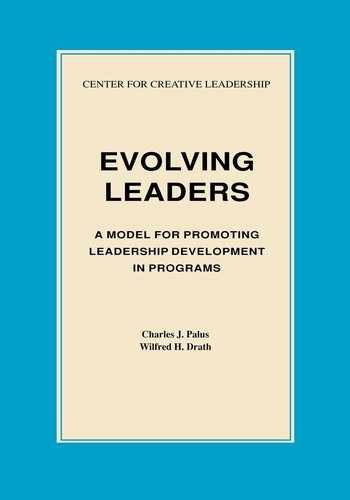We should say a bit about the background of this paper.
In 1991 a team, which included the first author, began a research project to assess a new Center program called LeaderLab®. We wanted to look at more than the teaching and learning of competencies, to see the program in relation to the subtlety and complexity of human growth, adaptation, and change. We realized that development programs are not the only influence on the growth of participants; work, family, community, and self are also factors. We were, in addition, interested in the idea of readiness for development—that people differ in how ready they are to develop—as previously raised by Chris Musselwhite and Ellen Van Velsor (Musselwhite, 1985; Van Velsor & Musselwhite, 1986) in their studies of the Center’s “Leadership Development Program.” With all these complexities, it seemed important to us to “break set” and see the new program in new ways. That is when we first conceived of the model presented in this paper.
Around the same time, the second author published an article (Drath, 1990) that made use of the adult developmental framework of Robert Kegan (1982). This interpretation of the life experiences of senior executives in the Awareness Program for Executive Excellence (APEX)® connected the work of the Center to that of the study of adult life span development, a connection further explored in the present paper.
Also around that time the staff of the Center engaged in a lengthy dialogue on whether we should endorse and disseminate a definition of leadership. Ultimately it was decided not to adopt any single definition (because the range of Center activities, from training to research, makes it impractical to have just one), but that discussion helped us develop a new understanding of leadership (see Drath & Palus, 1994). That led naturally to a new way of understanding leadership development.
The model in this report is currently being used by a team designing a new organizational simulation. The simulation is envisioned as a tool that will help participants develop by having them respond to scenarios representative of emerging organizational issues. The team, which includes both authors, has had to stretch itself in thinking about the nature of leadership and about how its development may be facilitated. Its work has enriched the content of this report.
We want to emphasize that this paper is not an exposition of “the way things are.” The study of leadership resists demonstrations of enduring truths. It would serve our dialogue with you, the reader, much better if you would consider this paper an invitation to join us in thinking, “What if…?” What if we ponder leadership and leadership development in certain new ways? What then happens to our sense and practice of it? What do we encounter and discover? What might we be missing in our present perceptions? This approach seems most sensible, as the horizon of the future is coming right at us, as we reframe our organizations and ponder the way things might be.
For this invitational mood of language we owe the psychologist George Kelly, who contrasted the statement, “The floor is hard” with the statement, “Suppose we regard the floor as if it were hard” (Kelly, 1969, pp. 148-149; see also Korzybski, 1941). The former seems obvious and not worth discussing. Case closed. The latter
leaves both the speaker and the listener, not with a conclusion on their hands, but in a posture of expectancy …. It suggests the floor is open to a variety of interpretations or constructions. (Kelly, 1969, p. 149)
Out of this further exploration may come, not so much confirmation that it is really hard or that it is really soft … but a sequence of fresh experiences that invite the formulation of new hypotheses. For example, one may come up with a notion of relativism, that is to say, the floor is harder than some things and softer than others…. He may launch out and contrive the notions of resilience and plasticity to account for what happened when he treated the floor as if it were soft. (Kelly, 1969, p. 160)
Please join us, then, in a train of thought, “a sequence of fresh experiences.” We ask that you not surrender your current ideas about leadership and leadership development. (After all, “The floor is hard” remains a highly useful concept.) Your own hard-won ideas in these matters will surely add to what we have to say.
